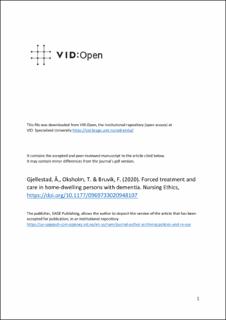Forced treatment and care in home-dwelling persons with dementia
Journal article, Peer reviewed
Accepted version
Permanent lenke
https://hdl.handle.net/11250/2753295Utgivelsesdato
2020Metadata
Vis full innførselSamlinger
Sammendrag
Background: The use of forced treatment and care of home-dwelling persons with dementia is a universally important topic. These patients are completely dependent on care from others to continue living at home.
Aim: This study aimed to gain insights into formal decisions related to the forced treatment and care of home-dwelling persons with dementia.
Design and sample: This is a cross-sectional study, based on formal decisions of forced treatment and care of home-dwelling persons with dementia in Norway between 1 January 2015 and 31 December 2016.
Methods: Descriptive statistical analysis. Statistically significant associations suitable for binary logistic regression were presented as odds ratios with 95% confidence intervals.
Ethical considerations: Approved by The Regional Committee for Medical and Health Research Ethics, and by the Norwegian Center for Research.
Results: We found 108 formal decisions of forced treatment and care of persons with dementia. Decisions of admission represented 57% of the data, other medical and safety decisions 27%, and assistance with activities of daily living 16%. In most cases, physicians were responsible for the decisions (77%), but nurses and family members were often involved.
Discussion and conclusion: This study demonstrated a prevalence rate of formally documented decisions of forced treatment and care much lower than findings in previous studies. Poor documentation may constitute a risk for the safety and wellbeing of persons with dementia. Although physicians were usually responsible for the decisions, nurses and family members were often involved in the process. Family participation in forced treatment and care raises ethical dilemmas. More research on the experiences of nurses, persons with dementia and family members with forced treatment and care is needed to aid ethical, legal, and clinically challenging decision-making processes.
